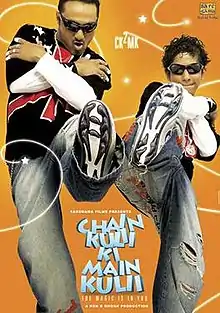Chain Kulii Ki Main Kulii
Chain Kulii Ki Main Kulii (Hindi: चैन कुली की मैन कुली) is a 2007 Hindi-language Indian fantasy sports Comedy film directed by Karanjeet Saluja (also known as Kittu Saluja).
| Chain Kulii Ki Main Kulii | |
|---|---|
 | |
| Directed by | Karanjeet Saluja |
| Produced by | Sweta Agnihotri Ken Ghosh Shashikant Khamkar Namrata Rungta |
| Screenplay by | Nupur Asthana |
| Story by | Jay Kumar Satyam Tripathi |
| Starring | Rahul Bose Zain Khan Susheel Parashara Rajesh Khera Meera Vasudevan Nasirr Khan Raj Bhansali |
| Music by | Salim–Sulaiman Sandeep Shirodhakar |
| Cinematography | Promod Kumar Pradhan |
| Edited by | Shaju Chandran |
Production company | |
| Distributed by | Saregama HMV |
Release date |
|
Running time | 92 minutes |
| Country | India |
| Language | Hindi |
| Box office | ₹6,498,000 (US$91,000) |
It stars Zain Khan and Rahul Bose as the lead protagonists. The film's title is taken from lines spoken by Amitabh Bachchan's character in the 1982 film Satte Pe Satta. The film is based on the Hollywood movie Like Mike. The film features music by Salim–Sulaiman and lyrics by Irfan Siddiqui. Cricketer Kapil Dev also makes a cameo appearance in the film.
Plot
Karan (Zain Khan) is a thirteen-year-old boy who lives in a dilapidated orphanage owned by a stern, uncouth warden, John "Hitler" Kakkad (Rajesh Khera). Karan has two dreams: one is to have parents and the other is to be a big Cricketer. His inspiration is Kapil Dev, since he has been brought up on the motivating His dreams take a turn when one day, he lays his hands on an old cricket bat which Karan is convinced is the bat that Kapil Dev used to win the 1983 World Cup; for him, the bat becomes a magic bat. One day by a stroke of luck, the coach of the Indian cricket team spots Karan playing cricket and is highly impressed by his batting skill. At that point in town, the Indian cricket team has been going through a "rough patch".
Karan and his magical bat are inducted into the Indian cricket team as the opening batsman along with the captain, Varun (Rahul Bose). When Karan marches onto the pitch and wins the match for India, he soon becomes the nation's heartthrob. Although he was formerly rejected by adopting couples, he is now the most sought after kid in the country. However, Raghav (Raj Bhansali), the orphanage bully, hates him and feels that if Karan did not have the magic bat he would have never made it to the cricket team. Raghav now wants the magic bat at any cost. Karan and Varun develop a strong emotional bond deeper than fellow cricketers. Karan has no parents and Varun has parents, but is estranged with his father and does not want to accept him. Karan strongly believes that parents are the best gift endowed by God and succeeds in uniting Varun with his father.
At the final 5th one day match between India and Pakistan, events spiral out of control and Karan's magic bat is destroyed by Raghav. Karan is a nervous wreck, but Varun makes him realise that the bat was in fact just an ordinary bat, and it was a mere coincidence that two players viz. Karan and Kapil Dev who used that bat were both incredibly talented batsmen. Karan could get the magic back forever, if he places faith in himself instead of the bat. With Karan's help, India wins the match. After the match, Karan decides to stop playing and re-join the team when he is older. Varun and his girlfriend whom he marries, Malini (Meera Vasudevan) decide to adopt Karan.
Cast
- Zain Khan as Karan
- Rahul Bose as Varun Roy
- Meera Vasudevan as Malini
- Rajesh Khera as John Kakkad
- Deiptimaan Chowdhury as Dabboo
- Raj Bhansali as Raghav
- Sushil Parashar as Bholu Dada
- Kapil Dev as himself (cameo)
- Nasirr Khan as Commentator
Music
- "Phir se aa gaya Sunday" – Armaan Malik, Sharavan Iyer, Kaustav, Chorus
- "Jhatka Phatka" – Kailash Kher, Vijay Prakash, Hrushitesh Kamerker, Mangal Mishra, John Stewart, Salim Merchant
- "Khulla Asmaan" – K K, Salim Merchant
- "Chain Kulii Ki Main Kulii" – Kunal Ganjawala
Box office
Chain Kulii Ki Main Kulii failed to get a good response at the box office. The film released after schools had re-opened, which resulted in collections in single digits, earning only Rs. 890,000 in its opening week. In India it grossed 6.4 million and was failed badly at the box office.[1] It was declared a disaster at the box office. The movie however turned into a cult hit amongst the Indian audience after its broadcasting in cartoon channels in the years following the release.